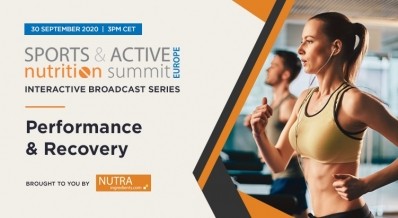SPORTS NUTRITION SUMMIT 2019
Sports Nutrition Summit: ‘Food first approach over supplement use,’ ESSNA recommends

Those thoughts will be discussed in greater detail by Ross Austen, vice chair of the European Specialist Sports Nutrition Alliance (ESSNA), at this year’s NutraIngredients Sports Nutrition Summit (SNS).
In his presentation Austen, an expert in performance nutrition, presents a case for a ‘food-first approach’ for both elite and leisure athletes, with highly selective supplementation as a last resort to fill clearly identified gaps.
He also points to the dubious marketing strategies of some brands that tout their supplement as a ‘magic bullet’ aiding fat loss, building muscle etc.
“The foundations for a healthy eating regime, eating the appropriate macros/micros around your training plan must be the first port of call when looking for performance gains,” he explains.
“The fine tuning of this regime and supplementing areas, which would otherwise be lacking is indeed appropriate and often necessary but I believe the greater gains can first be found in addressing the basics.”
Caffeine, creatine et al
ESSNA’s vice chair since 2018, Austen’s thoughts about a food-first approach align closely with those of The International Association of Athletics Federation (IAAF).
The Sports Nutrition Summit, brought to you by NutraIngredients is back for a second year!
Bringing together industry and research professionals in the active and performance nutrition space, the Sports Nutrition Summit aims to bridge the gaps between cutting edge science, business strategy and key regulatory developments to shine a light on the key consumers in the sports and active nutrition industry, and what you can do to meet their needs.
Challenging you to know your market the 2019 programme will explore the latest scientific and product developments across the consumer spectrum - looking at active sports nutrition consumers by category, life stage and by geography.
In its updated guidelines for athletes, The Federation highlights caffeine, creatine, nitrate/beetroot juice, beta-alanine and bicarbonate as the only supplements with evidence pointing towards their contribution to performance.
“Currently there are only a handful of products that show performance improvements and so more research is required,” said Austen.
“That being said the placebo effect has been shown to be pretty powerful resulting in a positive impact on performance.
“Therefore, if the individual whole heartedly believes the products are assisting their performance, so long as they are not causing any untoward harm and the risk of inadvertent doping is being managed, I would lean towards suggesting that the athletes and nutritionists should have the autonomy to make that call.”
Supplementation for elderly
Despite Austen’s preference for whole food consumption, he does think supplementation has its place particularly in the older athlete, where doctors may prescribe supplements to address iron deficiency or where eating whole foods prove physically difficult.
“I 100% agree the aging population are suffering from sarcopenia (muscle loss) as a result of anabolic resistance and a decline in exercise activity,” says Austen.
“Anabolic resistance can be counteracted by a higher intake of protein over the course of a day.
“Therefore the use of nutritional shakes or boosting meals with protein powders can go a long way to reach the desired levels,” he adds.
In summing up his thoughts, Austen believes supplement providers can do more to remain relevance to athletes alongside providing hard evidence, collaborative research and honesty.
“There is a real risk of inadvertent doping to athletes,” Austen says. “It is integral for supplement providers to ensure they carry out the necessary testing via programmes such as Informed-Sport to provide assurances to athletes and end consumers.
















